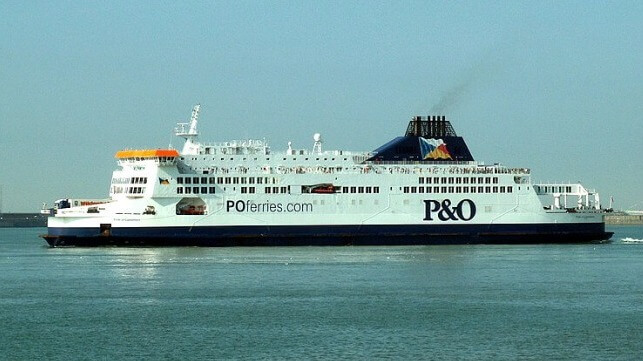UK Launches Legislative Response to P&O Ferries Firing Seafarers

P&O Ferries continues to make slow progress to restoring full operations clearing a second of its Dover to Calais ferries for service just as the UK government began efforts to enact the threatened seafarer wage legislation. The government announced during the Queen’s Speech to Parliament that it is beginning the legislative process in response to P&O’s firing of 800 seafarers and replacing them with a lower paid agency workforce.
Nearly two months after the company suddenly fired its crews, nerves remain on edge with the unions continuing their protests and boycotts. The government found itself largely powerless to reverse the action prompting the wage legislation. While the legislation has largely been supported some worry that it would affect other segments of the shipping industry beyond ferries, while the authorities managing the ports complain that the Maritime and Coastguard Agency should have responsibility for enforcement, not port officials.
As the regulators for maritime safety, the MCA largely stayed out of the fray instead enforcing strict inspection routines on each of P&O’s ferries before they have been permitted to resume service. A ferry operating between Northern Ireland and Scotland was detained for deficiencies as were two of the company’s cross channel ferries on its busiest route between Dover and Calais. Service just recently resumed on the route with one of P&O’s four ferries permitted to resume sailing.
Pride of Kent, the company’s 30,635 gross ton ferry became the second vessel on the route to clear a suspension on May 9. The 30-year-old vessel received 47 deficiencies including 13 that were grounds for detention during three failed inspections and was detained for 42 days. The Paris MOU summary shows the fire detection and alarm systems, bilge pumping arrangements, fire doors, closing of fire doors, and ports were all not as required, while the fast rescue boats were inoperative and the engine room was dirty. Other issues included a lack of training and familiarity of the new crew with the vessel’s emergency systems.
P&O did not comment on the clearance only reporting that it would continue to operate a single vessel service on the route till May 12. Two other vessels that normally sail the route to France, Pride of Canterbury and the Spirit of France, are still out of service and have yet to be inspected by the MCA.
“P&O Ferries’ disgraceful actions do not represent the principles of our world-leading maritime sector, and changing the law on seafarer pay protection is a clear signal to everyone that we will not tolerate economic abuse of workers,” said UK transport secretary Grant Shapps in announcing that the government had opened the consultation period on the proposed measures. “We will stop at nothing to make sure seafarers in UK ports are being paid fairly.”
Announced in the Queen’s Speech where the government outlines its priorities for the next legislative session of parliament, they announced that the new laws mean that all ferry operators who regularly call at UK ports will be legally obliged to pay an equivalent to the UK National Minimum Wage to access those ports, closing a legal loophole between the UK and international maritime law that government says P&O Ferries “ruthlessly exploited.”
Industry officials however raised concerns as the government said, “It will examine what sort of vessels could be included beyond ferries, and what the enforcement measures will be,” including possibly surcharges, suspension of port access, or fines. The government, however, did commit to consult closely with the ports and maritime sector on the new laws.
Richard Ballantyne, Chief Executive at the British Ports Association, responded by issuing a statement expressing concerns that ports should not be in the position to enforce the new regulations. “Enforcing the minimum wage is not an area where ports have a core competency. This should be a job for the Maritime & Coastguard Agency or HM Revenue & Customs,” he said while also raising concerns about
compatibility with the UK's obligations under international treaties. “It remains unclear whether the bill will achieve the government's aims of improving long-standing issues for seafarers.”
In addition to the legislation, the UK government is calling for the creation of “minimum wage corridors,” saying it is in consultation with France, the Netherlands, Spain, Germany, Ireland, and Denmark. The UK’s proposal is that seafarers on routes between either country must be paid at least the equivalent of the minimum wage.
The government also said that this year it will hold an international summit on seafarers’ rights to improve conditions for seafarers around the world.

that matters most
Get the latest maritime news delivered to your inbox daily.
Photo by Alf van Beem (CC0 1.0 public domain license)
